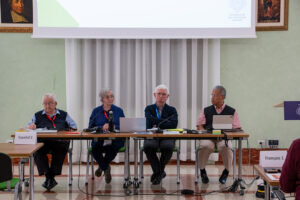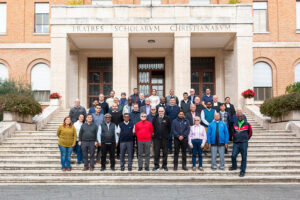Lasallian International Conference on Safeguarding advocates for Safer Environments
 The first International Lasallian Conference on Safeguarding was held in Rome from 10 to 16 November 2024, under the patronage of Saint Joseph, Protector of the Institute, and organised by the Office of Safeguarding and Integrity of the Institute, led by Brother Aidan Kilty. Supporting the latter, as facilitators, were Tina Campbell, international Consultant and Expert on Child Safeguarding, who has already worked with several Congregations around the world, and Brother Ambrose Payne, ANZPPNG, who has been responsible for more than 20 years for the development of integral safeguarding programmes, policies and procedures in his District.
The first International Lasallian Conference on Safeguarding was held in Rome from 10 to 16 November 2024, under the patronage of Saint Joseph, Protector of the Institute, and organised by the Office of Safeguarding and Integrity of the Institute, led by Brother Aidan Kilty. Supporting the latter, as facilitators, were Tina Campbell, international Consultant and Expert on Child Safeguarding, who has already worked with several Congregations around the world, and Brother Ambrose Payne, ANZPPNG, who has been responsible for more than 20 years for the development of integral safeguarding programmes, policies and procedures in his District.
At the request of Brother Armin Luistro, Superior General, whose presence throughout the Conference was particularly appreciated by the participants, the aim of the meeting was to support the District Coordinators in implementing the Institute’s Safeguarding standards in all communities and ministries in the Districts, as part of the commitment to create a safer Institute for “all those entrusted to us”, especially children, young people and vulnerable adults.
The Institute’s decision to insist that each District appoint a specific Safeguarding Coordinator was the natural continuation of a reflection that had arisen at the end of last year between Br Armin Luistro, Superior General, Armin and the Institute’s Office of Safeguarding and Integrity, according to which many Brother Visitors needed very specific help at the local and District level to deal with the issues of safeguarding minors and vulnerable people.
“A key element of the meeting was to understand how to deal with the victims of abuses that have happened in some of our institutions or in our communities,” says Brother Aidan Kilty, “and follow the policies and protocols that we need to have in place so that we can ensure a safer Institute, safer Church and safer institutions”. “We have tried to identify the key structures that are needed to help a District make itself safe and its protection of youngsters and vulnerable adults,” continues Brother Aidan. But such an demanding and important job cannot be done by the Brother Visitor alone, “it is necessary to appoint a District Safeguarding Coordinator and a District Safeguarding Commission” to be the first direct contact for any issue that may arise in a District.
 Brother Moses Abunya, Auxiliary Visitor and Coordinator for Safeguarding in the Lwanga District, also says that “the commitment of all is to prevent abuse and to implement the right procedures especially towards those who perpetrate it. In the District we have been training across the various countries that make up the District on this serious issue, and being here together with other people and experts raises everyone’s awareness and commitment. “I am truly happy to be here,” concludes Brother Moses.
Brother Moses Abunya, Auxiliary Visitor and Coordinator for Safeguarding in the Lwanga District, also says that “the commitment of all is to prevent abuse and to implement the right procedures especially towards those who perpetrate it. In the District we have been training across the various countries that make up the District on this serious issue, and being here together with other people and experts raises everyone’s awareness and commitment. “I am truly happy to be here,” concludes Brother Moses.
Lourdes Lopez Alvarez, District Co-ordinator of the Comunidad Segura ‘Safe Community’ Programme (District of Antilles-Mexico Sur), expresses the same satisfaction for the participation in this Conference. She expresses her enthusiasm because “we have created a synergy to work together and to be able to safeguard the rights of the children who are entrusted to our Lasallian educational mission. It has become clear to us that the Safeguarding and Integrity programme is everyone’s responsibility.”
Adding to the comments was that of Colette Allix, a member of the listening group for victims of abuse in the District of France, who among the many reflections raised during the days’ work also highlighted that relating to the ‘reliability’ of the words that children, with regard to abuse, can say and the concepts they can express, ‘taking into account cultural differences in particular’.
The central purpose of the conference and the key role of the facilitators present at the meeting was, therefore, to provide all those appointed to this position with the necessary skills and training to cope with such a demanding responsibility, especially with regard to risk management, responding to complaints and allegations, and creating safe institutions for children.
The various presentations were accompanied by a combination of personal reflections, plenary sessions to raise questions, case studies, role-playing and group conversations.